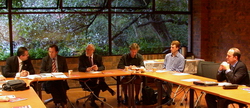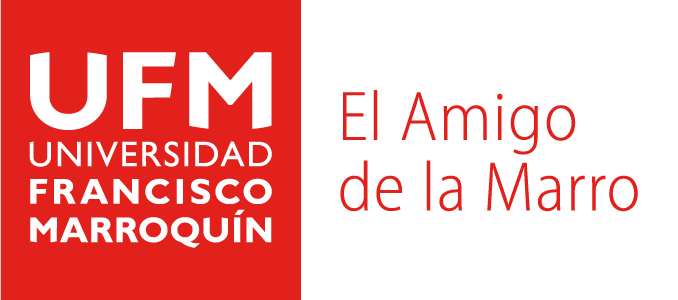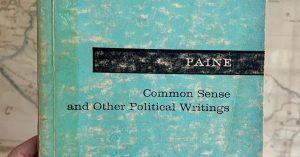 |
| Partial view of the participants |
In order to know the Pacts of La Moncloa, whose main value resides in the capacity to reach agreements that allow a country to reach out in the future at a medium term, the Institute of Political Studies of the Francisco Marroquín University, summoned to a session of reflections, explained Pedro Trujillo, director of the EPRI.
With the participation of UFM´s President, Giancarlo Ibárgüen S., and Trujillo, among the attendees were representatives of the Institute, from Spain´s Embassy in Guatemala; and from the Coordinating Committee of Agricultural, Commercial, Industrial and Fianancial Associations. The exhibition was headed by Guillermo Adrizone, Council Minister of the Spanish Embassy; and the commentaries by Carlos Sabino, guest professor at the UFM.
Sabino talked about the context in which the Pacts of La Moncloa occurred. «The constitution still was not approved, there was a serious risk of social confrontation due to high inflation that diminished the wages and to the lack of a firm institutional frame for the transition to democracy. In this sense the reached agreements must be considered as pacts of governability, that were effective to guarantee the basic consensus in which institutions of a liberal democracy could work», explained Sabino.
«The consensus, nevertheless, did not reach a total agreement: organizations like ETA were left outside, who rejected it as a whole and therefore, continued and intensified their subversive activities. He emphasized the case of Venezuela, where there were ample consensuses that did not obtain, nevertheless, to include those in favor of Chávez. Such pacts of governability are very useful in specific conditions, but cannot be used in any circumstance and they do not replace, by themselves, the lack of a general consensus about the political system per se», noticed professor Sabino.
«In 1977, the political situation in Spain acquired a special dynamism. Hardly two years had paseed since general Franco´s death, who had exerted as Chief of State in last the four decades. The Monarchy, just restored, is not consolidated, much less totally accepted. The political parties had just been legalized and some, like the Communists and Socialists, generated, among the population, opposed feelings by the historical load and its role at the arrival of the Republic to Spain and the consequent Civil War (1936-39), they lacked a Constitution and still its rough draft struggled and, finally, the army´s loyalty direction was not known», indicates the document from which the reflections in the colloquy originated.
«The government was questioned, also the monarchy and, the return to the dictatorial regime of the past was longed for. That delicate climate was originated in the context of the Cold War, that also polarized to the world», he indicated.
«It is in that historical frame, where most of the Spanish political parties decided to seat and engage in a dialog, generating the Pacts of La Moncloa, whose more remarkable and lasting essence is the capacity to reach agreements that allow a country to reach out in the future at a medium term. This is, in essence, the main value which was commented in the meeting. Many aspects were modifyed, or evolved with time, others remained and consolidate today a more developed country; those elements are reduction of labor costs for the companies, fiscal reforms, limitation and exemplarity of the consuntive State expenses, control in the allocation of resources, legal control, audit control and effectiveness, elimination of legal and administrative ties, disappearance of unnecessary intermediaries, to obtain a greater freedom of market and to reduce the direct State intervention, research development and the developmnet of energy sources, revision of the oficial secret concept, definition of the army´s role and the public order forces», indicated Trujillo.
More photos,
here.
Recientes
- 1
- 2
- 3
- …
- 1.542
- Siguiente »



